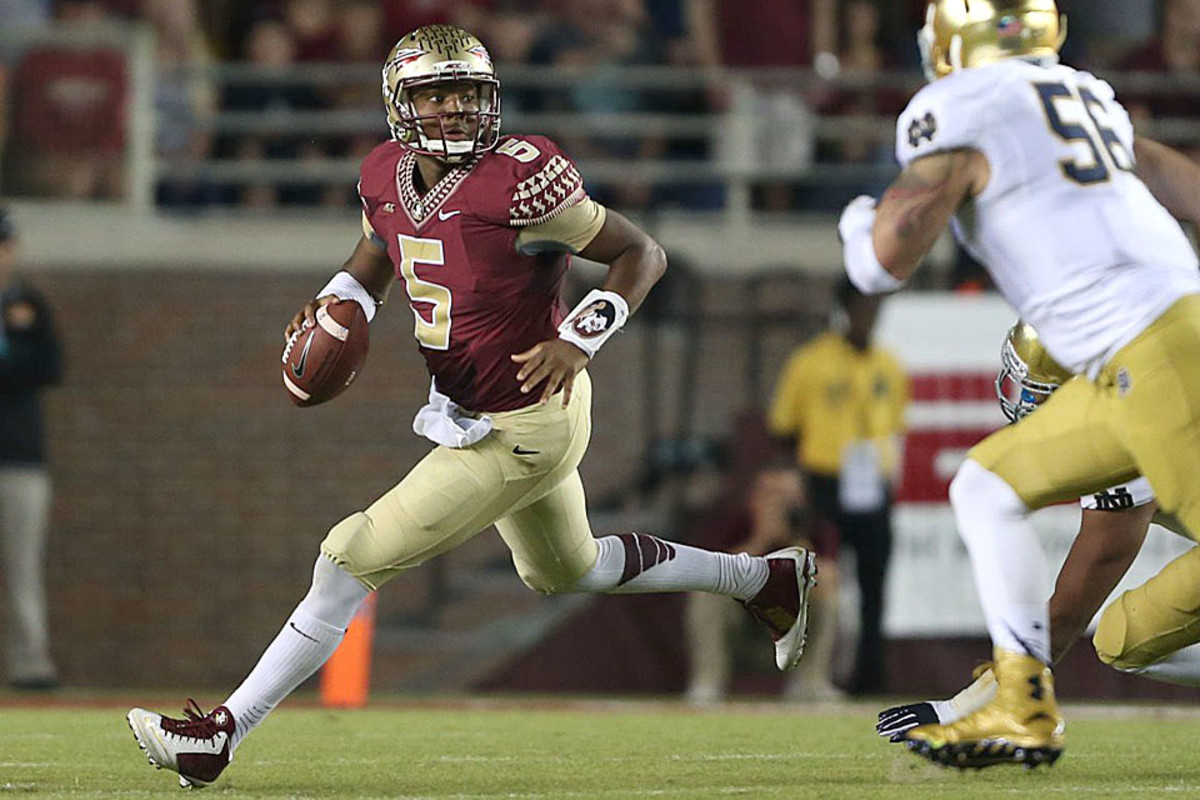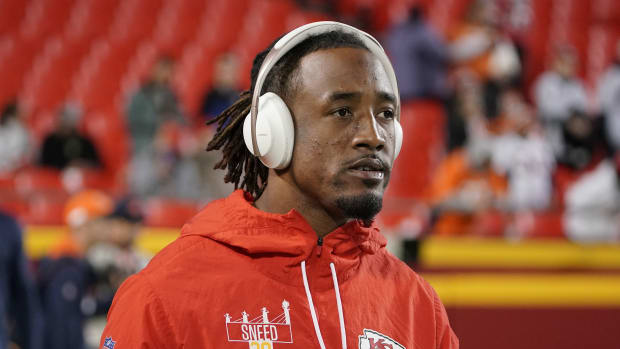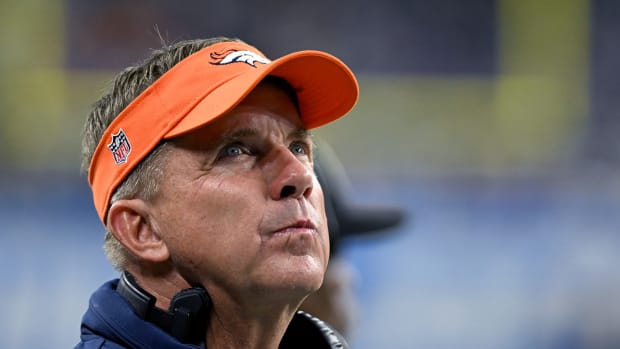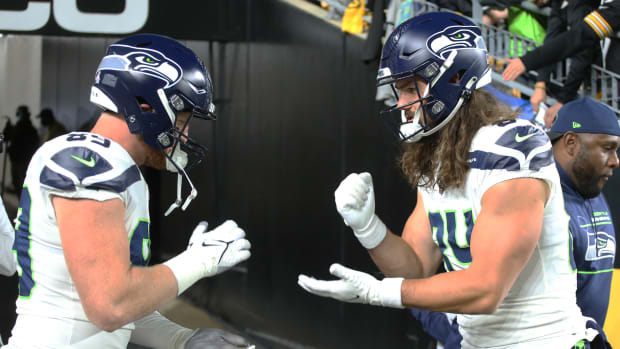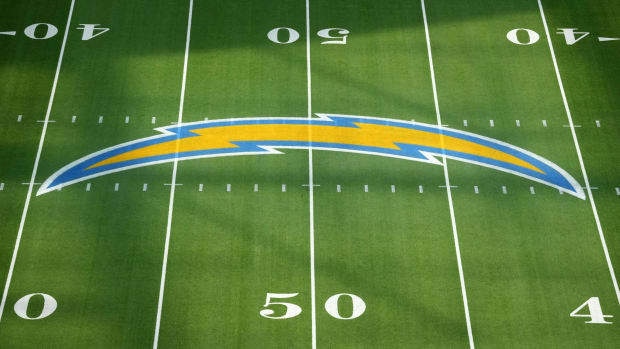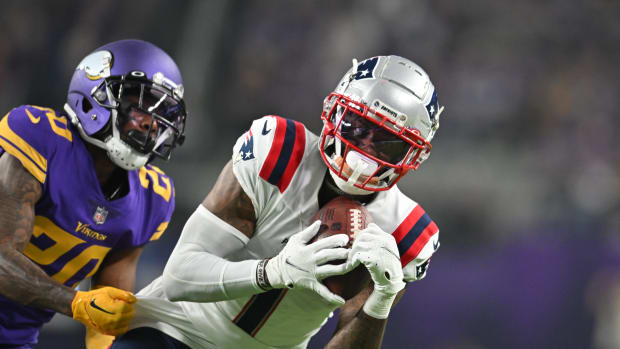Is There A Franchise QB in the 2015 Draft?
Who is the top quarterback in this year’s draft? Can a defense be particularly good at forcing turnovers or is it random luck? We attempt to answer those questions, plus five thoughts on conference championship Sunday, in this week’s edition of Settle This.
Have an off-season question about your team? Which free agents should they retain? Who should they chase? What makes sense for a draft plan? Your questions and input make this column go, so send over any queries to talkback@themmqb.com.
The rookie quarterback class didn’t have any breakout QBs this year. Derek Carr started every game for a terrible team and had moments when he looked good and other moments when he looked awful. Blake Bortles and Teddy Bridgewater started for most of the year with Bridgewater getting better and Bortles not really looking that good (but still showing flashes). Zach Mettenberger started a few games for another terrible team before getting hurt. Johnny Manziel... well, you know.
Is there a QB available in this year’s draft that you’re high on?
—Larry Hannan
Jacksonville, Florida
Thanks for writing in, Larry. We’ll take a closer look at this question during the run up to the draft, but I’ll take a stab at it now.
So far, I have scouted Marcus Mariota and Jameis Winston in person and on film. Here’s the cliff notes version:
I like both prospects very much. On the field, Winston is clearly the better prospect because he’s easier to project to the NFL. Because of Florida State’s pro-style system, he’s nearly plug-and-play. I think Mariota can play and will flourish in any system, although he’ll need time to adjust after coming up in Oregon’s system. I think that Mariota can handle much more on his plate in terms of reading defenses, but it’s something he just didn’t have to do as often in the Ducks’ system.
Wet Blanket of Reason
Greg A. Bedard earned his u201cWet Blanket of Reasonu201d nickname for his long history of tempering rabid fan enthusiasm with cold, hard, irrefutable facts. He’ll take the same approach to settle your arguments on a weekly basis. To catch up on Settle This, CLICK HERE. Email ideas for future topics to talkback@themmqb.com with the subject line 'SettleThis, or tweet at @GregABedard.
Follow The MMQB on Facebook, Twitter and Instagram
That being said, I have concerns about both. Winston off the field is obviously a huge concern. I didn’t like the vibe I got watching him. I came away with the feeling that he’s a diva who was enabled by FSU’s program. Winston is not used to people standing up to him. He’ll need to get used to that really quick if he’s to succeed long-term in the NFL.
With Mariota, while I have no doubts about his inner competitive drive, character and work ethic, I do have some concerns about whether or not he’s the type of quarterback that will lead and others will look to when the chips are down. I didn’t get a strong feeling on that watching him in the national championship loss to Ohio State (and I thought he played reasonably well without much help). In the NFL, guys like Aaron Rodgers, Tom Brady, Russell Wilson, Andrew Luck, Ben Roethlisberger, Drew Brees and Philip Rivers… those guys exude confidence in the most dire of circumstances. Can Mariota have that same impact? Maybe. Then again, a player like Eli Manning has two Super Bowl rings and he’s not exactly the rah-rah type.
I think both Mariota and Winston, if he does the right things off the field and in the locker room, will be highly successful in the NFL.
We’ll have looks at other quarterbacks starting next month, so stay tuned.
When NFL defenses are described as relying on takeaways I get curious as to whether this is a real phenomenon or a statistical anomaly for one season. I would think that if it's a coaching emphasis/difference it should persist from one season to another, but my impression (without statistics to back it up) is that often this “strategy” completely collapses in the next season with teams going from large pluses to minuses in the takeaway ratio. Based on the stats over several seasons, can you determine whether this is a real thing or just random variation?
—Jeff Robbins
Here goes nothing, Jeff.
Let me preface this by saying that I have absolutely zero experience with statistical analysis beyond adding, subtracting and dividing. But I’m going to try something here. I did consult with my math major wife (like Bill Belichick, I know how to minimize my weaknesses), but I really have no clue whether I did this right. I’m sure there will be plenty of statisticians, including friends Aaron Schatz and Mike Lopez, who will chuckle at this and say, “Please, for all that his holy, stick to game film.”
I put all the turnover information (interceptions, fumbles) from the past five years into a spreadsheet, then I hit the “VAR.P” button with hopes that it would give me a very basic picture about the consistency in creating turnovers.
What I was able to glean:
Total turnovers are fairly random (25.5 variance), interceptions (15.5) more so than fumbles (9.5).
The Ravens have been, by far, the most consistent at creating turnovers the past five seasons (2.96 variance). The next closest teams are Minnesota (6), Tampa Bay (6.16) and Carolina (7.44). Is that the result of good players, good coaching and/or luck? I don’t think we’ll ever know.
The least consistent teams when it comes to forcing turnovers were a bit of a surprise for me, because they traditionally play good defense: Chiefs (71.4), Texans (67.8) and Jets (55), with other good squads like the Steelers (45.4), Seahawks (36.2), Packers (35.4), Lions (34.2), Patriots (33.8) and 49ers (29.4) not too far behind in the bottom third for consistency.
I was a bit surprised to see that the Patriots, who lead the league in forced turnovers the past five years (167), had their lowest total of that span in 2014 (25). From 2010-12, the Patriots forced 38, 34 and 41 with less talented units. That would indicate the Patriots are getting off the field more, and teams are a bit more careful about throwing at the likes of Darrelle Revis and Devin McCourty. But I think it’s a good sign for the Patriots that they are not as reliant on getting turnovers as they have in the past, since the further you go in the playoffs the less likely you are to get them (Packers, Patriots and Seahawks had the fewest giveaways this season).
All of this jives with what I read at FootballOutsiders.com (my go-to place for NFL analytics). In a 2004 column “Turnovers and the Unpredictably of Defense,” author Jim Armstrong concluded with these thoughts:
1. Defensive performance is significantly less predictable from one year to the next than offensive performance. Exactly why this is true is still a mystery. Perhaps it has something to do with the scarcity of talent among the players who play offense compared to those who play defense. Maybe injuries are a contributing factor, possibly because an offense can more easily exploit a weak link in the defense than the other way around. Or maybe there are some economic reasons that dictate inequalities and perhaps inefficiencies in player salaries. More research is definitely needed to shed some more light on this.
2. A defense's tendency to force turnovers is fairly important to the team's success, but it seems to be even more unpredictable. In general, a team's ability to force fumbles seems to be almost entirely luck. There is a little bit more persistence in a team's ability to force interceptions, though it isn't clear how much of this ability is just a residual effect of general defensive ability. Again, this only pertains to the team level. Whether there are some individual players with a special ability to force turnovers significantly above average rates would be an interesting subject for further study.
And Schatz added this note:
2) The fact that defensive turnovers are so unpredictable from year to year also explains why team defenses in fantasy football are so inconsistent from year to year—and should never be drafted high.
Tom Brady during the Patriots' divisional-round upset loss to the Jets four years ago. (Heinz Kluetmeier/SI)
Conference championship nickel package
1. If I’ve learned one thing covering the NFL, it’s that anything can happen on any given Sunday. I mean, I never thought in a million years that Mark Sanchez and the Jets would march into Gillette Stadium, where they had lost 45-3 a month earlier, and pummel the 14-2 Patriots by a score of 28-21 (it wasn’t remotely that close) in 2010. But they did.
Deep Dive Breakdowns
How can the Colts stop Gronk? Should the Pack attack Sherman? Andy Benoit highlights the match-ups and strategies that will make or break the conference championship games. FULL STORY
2. That being said, I have a tough time finding a way that the Colts can beat the Patriots. Indianapolis will have to play the perfect game. Andrew Luck will have to be flawless with help from a running game and not have his usual two or three mindless moments, and the defense will have to shut down Rob Gronkowski and force at least two turnovers. Could happen, but not likely.
3. It’s going to be a tough chore for the Packers to win in Seattle as well, especially with quarterback Aaron Rodgers not at full strength. Green Bay could really use his feet in this game, and he probably won’t have them.
4. The key for the Packers winning is the running game, on both sides of the ball. The way to beat the Seahawks is to negate their speed on defense by pounding them with the ground game, which helps create throwing lanes. That’s how the Cowboys and Chiefs each came away with victories, and how the Panthers hung around last week. If the Packers run for more than 150 yards with Eddie Lacy and James Starks, then they can most definitely pull the upset.
5. Defensively, the Packers must sell out to stop the run and maintain rush discipline against Russell Wilson. If Green Bay shuts down Marshawn Lynch, and does not allow Wilson to pick up first downs on scrambles, then it will be a battle deep into the fourth quarter. The Packers must make Wilson beat them through the air. It’s much easier said than done, but a one-dimensional Seattle offense is stoppable.
Follow The MMQB on Facebook, Twitter and Instagram.
[widget widget_name="SI Newsletter Widget”]
































